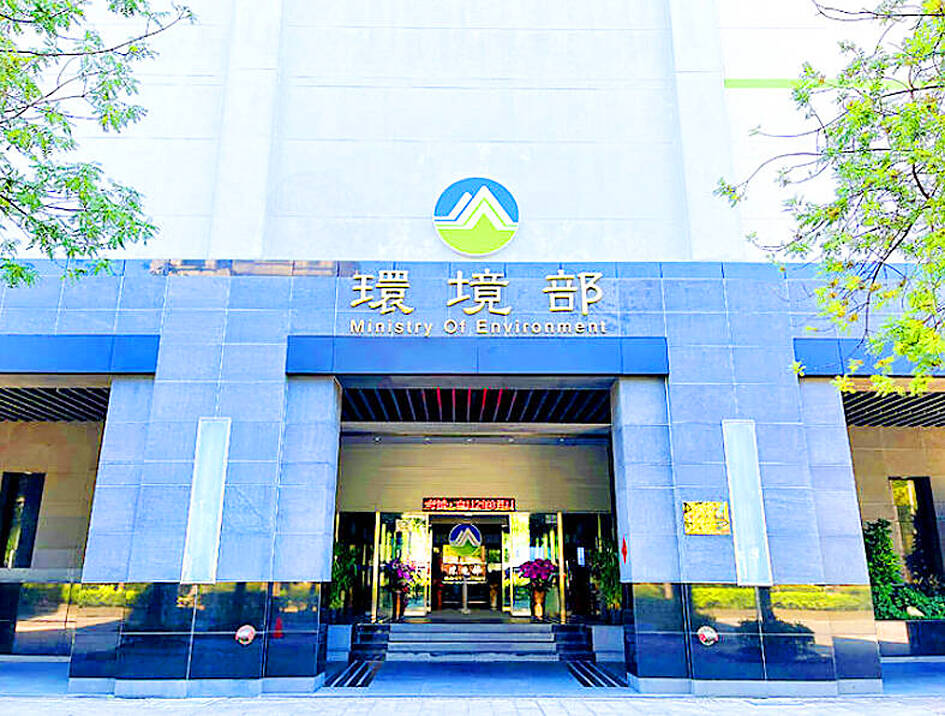The Ministry of Environment yesterday said it is planning to add 357 more perfluorinated and polyfluorinated alkyl substances (PFAS) to its list of banned toxic chemicals — which would only be allowed for research, testing and educational uses — by the end of the month.
It added it also plans to announce a ban on the use of nonylphenol and nonylphenol polyethylene glycol ether as industrial detergents by the end of the month.
PFAS are a class of thousands of synthetic chemicals, which have the qualities of making products resistant against water, stains and heat. These chemicals are commonly used in a wide variety of products, including food packaging, furniture and water-resistant clothing.

Photo: Chen Chia-yi, Taipei Times
However, as there are some studies suggesting that PFAS exposure could be associated with increased risk of cancer, more countries are banning their use.
There are 151 types of PFAS that are banned by the Ministry of Environment in the nation.
Head of the ministry’s Chemicals Administration’s Evaluation Management Division Lin Song-chin (林松瑾) yesterday said that perfluorooctane sulfonic acid (PFOS), perfluorooctanesulfonyl fluoride, perfluorooctanoic acid (PFOA), perfluorohexane sulfonic acid (PFHxS) and 147 kinds of PFHxS and its salts and related compounds are banned in Taiwan.
In accordance with the UN Stockholm Convention, the ministry plans to announce the prohibition of toxic chemical substances PFOS and PFOA, and their salts and related compounds — 357 types of PFAS — he said.
Currently, only the main substances of PFOS and PFOA are banned, so the next step is to also ban their salts and related compounds, he said.
After the 357 types of PFAS are added to the list of toxic chemical substances, the manufacturing, import, sale, and use would all be prohibited, he said.
There are seven local agencies that are using these PFAS, all for research and testing, and they could continue using them after submitting an application, he said.
The ministry also plans to limit the use of nonylphenol and nonylphenol polyethylene glycol ether, which are surfactants used as detergents and emulsifiers in many industries, Lin said.
Nonylphenol is classified as an environmental hormone, known to cause disorders in the endocrine system, and has been banned in household detergents in Taiwan since 2008, he said.
In accordance with the global trend of placing tighter control on such substances, nonylphenol and nonylphenol polyethylene glycol ether would be banned in industrial detergents, and the allowable concentration level would be reduced from 5 percent to 0.1 percent, he added.

Chinese Nationalist Party (KMT) Chairman Eric Chu (朱立倫), spokeswoman Yang Chih-yu (楊智伃) and Legislator Hsieh Lung-chieh (謝龍介) would be summoned by police for questioning for leading an illegal assembly on Thursday evening last week, Minister of the Interior Liu Shyh-fang (劉世芳) said today. The three KMT officials led an assembly outside the Taipei City Prosecutors’ Office, a restricted area where public assembly is not allowed, protesting the questioning of several KMT staff and searches of KMT headquarters and offices in a recall petition forgery case. Chu, Yang and Hsieh are all suspected of contravening the Assembly and Parade Act (集會遊行法) by holding

PRAISE: Japanese visitor Takashi Kubota said the Taiwanese temple architecture images showcased in the AI Art Gallery were the most impressive displays he saw Taiwan does not have an official pavilion at the World Expo in Osaka, Japan, because of its diplomatic predicament, but the government-backed Tech World pavilion is drawing interest with its unique recreations of works by Taiwanese artists. The pavilion features an artificial intelligence (AI)-based art gallery showcasing works of famous Taiwanese artists from the Japanese colonial period using innovative technologies. Among its main simulated displays are Eastern gouache paintings by Chen Chin (陳進), Lin Yu-shan (林玉山) and Kuo Hsueh-hu (郭雪湖), who were the three young Taiwanese painters selected for the East Asian Painting exhibition in 1927. Gouache is a water-based

Taiwan would welcome the return of Honduras as a diplomatic ally if its next president decides to make such a move, Minister of Foreign Affairs Lin Chia-lung (林佳龍) said yesterday. “Of course, we would welcome Honduras if they want to restore diplomatic ties with Taiwan after their elections,” Lin said at a meeting of the legislature’s Foreign Affairs and National Defense Committee, when asked to comment on statements made by two of the three Honduran presidential candidates during the presidential campaign in the Central American country. Taiwan is paying close attention to the region as a whole in the wake of a

OFF-TARGET: More than 30,000 participants were expected to take part in the Games next month, but only 6,550 foreign and 19,400 Taiwanese athletes have registered Taipei city councilors yesterday blasted the organizers of next month’s World Masters Games over sudden timetable and venue changes, which they said have caused thousands of participants to back out of the international sporting event, among other organizational issues. They also cited visa delays and political interference by China as reasons many foreign athletes are requesting refunds for the event, to be held from May 17 to 30. Jointly organized by the Taipei and New Taipei City governments, the games have been rocked by numerous controversies since preparations began in 2020. Taipei City Councilor Lin Yen-feng (林延鳳) said yesterday that new measures by